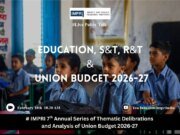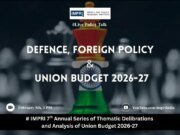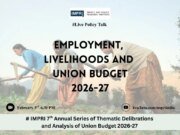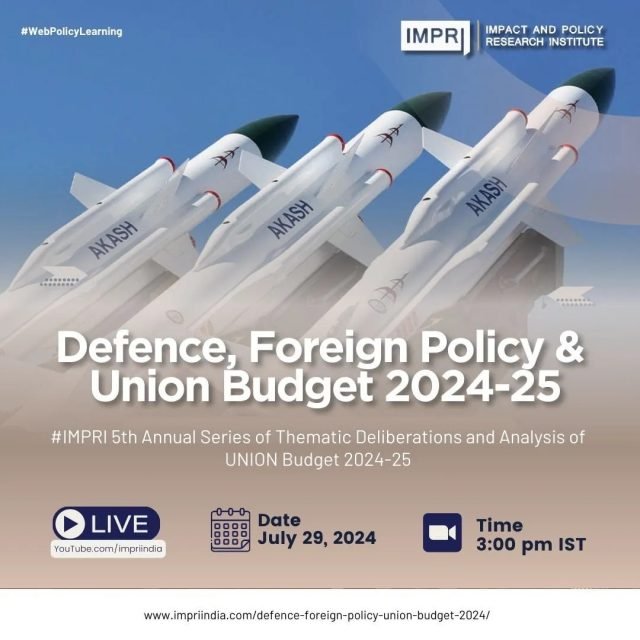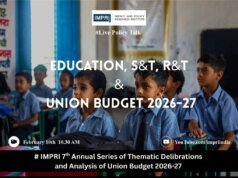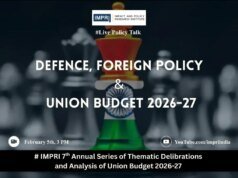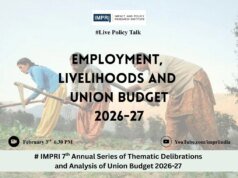Event Report
Reetwika Mallick
IMPRI Center for International Relations and Strategic Studies, IMPRI Impact and Policy Research Institute, New Delhi, hosted a panel discussion on ‘Balancing Priorities: Defence, Foreign Policy, and the Union Budget 2024-25’ under its 5th Annual Series of Thematic Deliberation and Analysis of Union Budget 2024-25 on 29 July 2024. This diplomatic dialogue aimed to delve into the heart of India’s security and its place on the world stage addressed under Union Budget 2024-25.
Chair & Moderator for the event was Dr Simi Mehta, CEO & Editorial Director, IMPRI. The esteemed panel of experts Prof Sanjukta Bhattacharya, Retired Professor, International Relations, Jadavpur University, Kolkata; Visiting Professor, IMPRI. Major Gen. (Dr) P K Chakravorty, VSM (Retd), Strategic Thinker on Security Issues; Visiting Senior Fellow, IMPRI Mr Robinder N Sachdev, President, The Imagindia Institute, New Delhi; Founder, The Lemonade Party Amb Anil Trigunayat, Distinguished Fellow, Vivekananda International Foundation (VIF), New Delhi; Visiting Distinguished Fellow, IMPR Dr Laxman Behera, Associate Professor, Special Centre for National Security Studies, Jawaharlal Nehru University (JNU), New Delhi. Prof Swaran Singh, Professor and Chairperson, Centre for International Politics, Organization and Disarmament (CIPOD), Jawaharlal Nehru University (JNU), New Delhi.
Dr Simi Mehta, CEO and Editorial Director at IMPRI nitiated the panel discussion on “Defence, Foreign Policy & Union Budget 2024-25” by introducing the esteemed panelists and outlining the focus of the discussion. Dr. Mehta emphasized the importance of evaluating how well the increased allocations align with India’s strategic goals and how they can be leveraged to strengthen the country’s position on the global stage. The panel aimed to provide insights and recommendations for optimizing defence and foreign policy strategies in light of the latest budget allocations.
Prof Sanjukta Bhattacharya, a Retired Professor of International Relations at Jadavpur University, Kolkata and a Visiting Professor at IMPRI rovided a thorough analysis of the Union Budget 2024-25 with a focus on the Ministry of Defence (MoD) and Ministry of External Affairs (MEA). Her insights underscored the need to evaluate the budget from a comprehensive perspective, rather than focusing solely on individual aspects.
The MEA faces capacity constraints, including a shortage of staff and diplomatic missions abroad. These limitations could affect India’s global reputation and diplomatic effectiveness. The discussion highlighted the need for balanced and forward-thinking policies in both defense and foreign affairs to navigate complex geopolitical landscapes and strengthen India’s position on the global stage.
Amb Anil Trigunayat, a distinguished fellow at Vivekananda International Foundation, New Delhi and a visiting distinguished fellow at IMPRI offered critical insights into the Union Budget 2024-25, particularly concerning its implications for the Ministry of Defence (MoD) and the Ministry of External Affairs (MEA). His remarks centered on the essential role of funding, quality, and specialization in these sectors.
While the budget increased the line of credit to other countries, many of these countries are wary of accumulating additional debt. This reflects a need to align such financial tools with actual demand and effectiveness. Ambassador Trigunayat’s remarks reflected a nuanced understanding of the challenges and opportunities facing India’s defense and foreign policy sectors. He called for a strategic approach that balances financial investment with effective implementation, quality, and innovative diplomacy to enhance India’s global position and influence.
Mr Robinder N Sachdev, president of the Imagindia Institute, New Delhi and Founder of The Lemonade Party provided a detailed critique of the Union Budget 2024-25, particularly focusing on defense and foreign policy. Mr. Sachdev highlighted that while India does not anticipate any imminent wars, there is a need for faster advancement of the military-industrial-technology complex to be prepared for future challenges. He emphasized that the current pace of preparation may not be adequate for the strategic demands of the 2030s.
Mr. Sachdev’s analysis stressed the need for a forward-looking approach in defense and foreign policy. He highlighted the importance of investing in advanced technologies and long-term planning for military readiness.
Major Gen. (Dr) P K Chakravorty, a VSM (Retd), a Strategic Thinker on Security Issues and a visiting senior fellow at IMPRI, New Delhi discussed the Union Budget 2024-25 with a focus on defense and military preparedness. Criticized the discrepancy between stated and actual defense budgets of other countries, like Pakistan, China, and Israel, suggesting India should examine its own defense spending more critically. Major Gen. Chakravorty stressed the need for comprehensive reforms, balancing technological advancements with substantial manpower and practical solutions to strengthen India’s defense sector.
Prof Swaran Singh, a professor and chairperson of the Centre for International Politics Organization and Disarmament at Jawaharlal Nehru University, New Delhi offered an analysis of the Union Budget 2024-25, emphasizing its implications for India’s foreign policy and defense strategy. Identified four key focus areas: Neighborhood, Look East Policy, Global South, and Indians abroad. Praised the emphasis on the Indian diaspora, aligning with Prime Minister Modi’s consistent advocacy for Indian interests overseas.
Prof. Singh’s insights suggest that while the budget reflects India’s strategic goals, there is a need for careful consideration of its implications for both domestic and international policy, particularly in enhancing defense capabilities and diplomatic reach.
Dr Laxman Behera, an Associate Professor of the Special Centre for National Security Studies at Jawaharlal Nehru University, New Delhi, provided a critical analysis of the Union Budget 2024-25 with respect to India’s defense and security needs. Dr. Behera’s insights highlight the need for a strategic approach to defense spending, focusing on effective utilization, reducing procurement delays, and investing more in R&D to enhance India’s self-reliance and defense capabilities.
Conclusion
During their ending notes, the speakers highlighted the need for the maximisation of the country’s resources and potential and melting the modern and the archaic to help India realise its dream of Viksit Bharat@2047. All the panellists consented to the inclusion of honorary consuls to expand the workforce of MEA and expansion of defence exports for better working of the defence sector.
Acknowledgement- Written by Reetwika Mallick, Visiting Researcher and Assistant Editor IMPRI.


